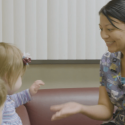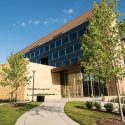Leadership institute aims to help researchers target health disparities
https://vimeo.com/153105190#embed
Twenty-five scholars from across the country are visiting campus the week of June 13 for the 7th annual Health Equity Leadership Institute (HELI), an intensive week-long “research boot camp” for investigators, particularly from underrepresented communities, doing research on health disparities and health equity. The institute aims to help these researchers achieve tenure track academic appointments and gain research funding through the National Institutes of Health (NIH).
African-Americans, Asian-Americans, Hispanics and Native Americans are underrepresented in the health care and public health workforce. These investigators often face obstacles such as difficulty securing research funding and mentoring, limited collaboration opportunities and feelings of loneliness and isolation.
HELI is hosted by the UW Institute for Clinical and Translational Research’s Collaborative Center for Health Equity (CCHE) in partnership with the Maryland Center for Health Equity in the University of Maryland School of Public Health. The program is designed by faculty at both institutions and includes large didactic sessions as well as small group sessions, special events and mentoring.
“The scholars coming to HELI 2016 are future leaders, and UW–Madison is lucky to host such an impressive group.”
Dorothy Farrar Edwards
It also showcases translational research efforts underway in Wisconsin. Each study has a health equity/disparities focus and most are being conducted with partners from underserved, racially and ethnically diverse communities. The institute highlights exciting community-based participatory research initiatives in rural and urban settings. Importantly, the institute is also designed to foster professional networking and to create a collaborative learning environment for Institute scholars as well as faculty and alumni.
Scholars are selected to create a cohort that is diverse across academic levels and disciplines, community experiences, career objectives and current roles.
The 2016 class comes from 12 states, from California to Missouri to Oregon to Kentucky. There are three scholars from Wisconsin, two from Maryland, and 20 national scholars. They conduct many different types of research: community-based participatory research, public health, behavioral health, health services, clinical, community-engaged, and more. They work in African-American, Hispanic, white, Asian, American Indian, Somali, Hmong, LGBTQ and low-income communities.
“The scholars coming to HELI 2016 are future leaders, and UW–Madison is lucky to host such an impressive group,” says Dorothy Farrar Edwards, professor of kinesiology and director of the Collaborative Center for Health Equity.
To become involved with the institute, contact Caitlin Scott at (608) 263-6982.
Tags: diversity, health care



